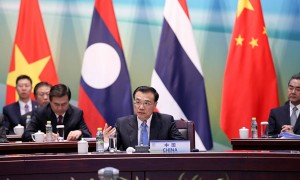The 10-part deal was hailed as an "early harvest" from the 100-day action plan that Chinese President Xi Jinping and US President Donald Trump agreed to pursue at their Mar-a-Lago meeting in the United States in April.
Under the agreement released on Friday, China agreed to resume imports of US beef by July 16. In return, the US agreed to open its market to Chinese cooked poultry.
In financial services, China pledged to grant market access to US credit rating agencies and credit card companies and agreed to issue licenses to "two qualified US financial institutions" for the interbank bond underwriting and settlement business.
Other agreements included the US easing restriction on liquid natural gas exports to China, the expediting of Chinese approval of US genetically modified products, and cooperation between Chinese and US financial regulators over cross-border settlements and transactions.
Beijing and Washington also agreed to discuss extending the initial 100-day action plan to a one-year plan. The two sides will hold the first meeting of the Comprehensive Economic Dialogue during the summer this year.
Vice-Finance Minister Zhu Guangyao said the deal was a result of cooperation based on the principle of mutual benefits, stressing that the agreement was not "a list of one side's concessions".
"The Chinese and US teams carried out nearly 30 rounds of consultation to achieve the agreement. It was a result of cooperation and reflected the expectation of the people of the two countries," Zhu told reporters at a news conference.
Vice-Commerce Minister Yu Jianhua said the agreement altered the expectation of a possible trade war between the two sides, adding that stable China-US relations will be a "positive force" for the recovery of the global economy.







